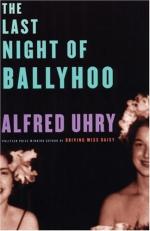|
This section contains 282 words (approx. 1 page at 400 words per page) |

|
The Last Night of Ballyhoo Summary & Study Guide Description
The Last Night of Ballyhoo Summary & Study Guide includes comprehensive information and analysis to help you understand the book. This study guide contains the following sections:
This detailed literature summary also contains Bibliography and a Free Quiz on The Last Night of Ballyhoo by Alfred Uhry.
In his second play, The Last Night of Ballyhoo, Alfred Uhry explores the lives of Jewish southerners, a society that he introduced to the American theater-going public with his Pulitzer Prize-winning play, Driving Miss Daisy. The setting and plot of The Last Night of Ballyhoo developed from stories Uhry heard growing up in a southern Jewish family, as well as his own experiences. As he told Don Shewey from American Theatre, "I went to one of the last Ballyhoos there was, when I was 16—it was like a German-Jewish debutante ball." However, Uhry also had a keen desire to explore Jewish identity, including prejudice inflicted on Jews by other Jews. Uhry combined these two interests to create the privileged world of the Levy/Freitag families. They live in a large home on one of Atlanta's finest streets. They belong to an elite country club. Their children may attend prestigious private universities. All these trappings and conveniences of wealth, however, cannot change the fact that they are Jews who live in an overwhelmingly Christian society. The prejudice that they experience as a result of their religion does not deter them from embracing mainstream southern society or from replicating this discrimination within their own culture; German-Jews such as the Levys and Freitags look down on "the other kind" of Jews—Eastern European Jews. While The Last Night of Ballyhoo deftly explores this anti-Semitism, Uhry also intersperses his serious message with sparkling banter, comedic non sequiturs, and hilarious characters and characterization. The Last Night of Ballyhoo was first produced at the Atlanta Olympic Games in 1996 and went to Broadway the following year; its play script is available from Theatre Communications Group.
Read more from the Study Guide
|
This section contains 282 words (approx. 1 page at 400 words per page) |

|



